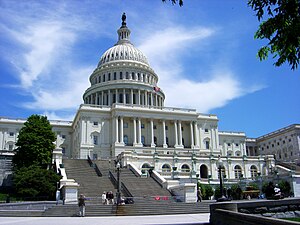 Image via Wikipedia
Image via Wikipedia
Our ongoing poll is turning out to be a tight race. The question is what should be changed about IDEA. Currently there is only a five vote difference between the top five choices. The poll is on the lefthand side of the blog. Be sure to make your voice heard. Vote!
My plan here is to collect some of your responses and present them to Congress. Sure I've got some ideas, but why not flex our muscles. The readership of this blog is growing. I'm quite proud that many different kinds of special ed stakeholders are tuning in. We have won awards and recognition. Heck, we even were granted a lenghty exclusive interview with the new Assistant Secretary of Education.
If there is power in numbers, why not present some of our thoughts as a group? I'll try to be fair in any presentation I make and I'll try to separate out my opinions (and as you know they can be strong) from group opinions or from group lack of consensus. I think that this may be exciting. Please let me know how you would change the special ed laws.
Special education law is a cycle of ever-changing requirements. Reauthorization of IDEA is now overdue. For relative newcomers, the cycle of special ed law is as follows: the law is passed by Congress, OSEP adopts regulations, the states adopt regulations, all of these are interpreted in hearing officer decisions and court opinions. Then just when we are starting to get comfortable (insert comfort joke here), Congress reauthorizes the law with many amendments, OSEP makes new regs ... This cycle is then repeats indefinitely.
I understand that the economy and health care might push reauthorization to the back burner for a while, but now is the time to start thinking about what changes we might welcome in the special education law. The good part of the "ever-changing" character of the law is that we can ask for changes just like the other players.
So I'm asking you - what would you change in IDEA? I know that many of you have strong opinions on transition planning and related issues. What else should be changed? I am considering requesting a change in the adversary nature of due process hearings and will continue a previous series of posts on that issue to try to flesh out the alternatives a bit more. Do you agree these changes should be made?
How about the Rowley standard? Should the meaningful educational benefit = appropriate standard be changed? Would you have the Congress reverse the other recent high court decisions: Weast (burden of proof in a dp hearing); Murphy (expert witness fees awarded to prevailing parents); Winkleman (parents can represent themselves in federal court on dp hearing appeals) Forest Grove (enrollment in public school as prerequisite to reimbursement for a private placement.)
Should attorney's fees be addressed?
How about Response to Intervention - is it working well as a means of identifying specific learning disabilities? Should it be expanded?
How about NCLB as it applies to kids with disabilities: do we like the accountability aspects? how about the high stakes test? What about the school sanctions provisions?
Do you think the role or mission of OSEP should change? What could it do better as the federal agency charged with enforcing the special ed law?
My plan here is to collect some of your responses and present them to Congress. Sure I've got some ideas, but why not flex our muscles. The readership of this blog is growing. I'm quite proud that many different kinds of special ed stakeholders are tuning in. We have won awards and recognition. Heck, we even were granted a lenghty exclusive interview with the new Assistant Secretary of Education.
If there is power in numbers, why not present some of our thoughts as a group? I'll try to be fair in any presentation I make and I'll try to separate out my opinions (and as you know they can be strong) from group opinions or from group lack of consensus. I think that this may be exciting. Please let me know how you would change the special ed laws.









In my view, Rowley has implicitly been made moot by the 1997 and 2004 amendments to IDEA and the accountability requirements of NCLB. The Rowley decision was based on a very different iteration of IDEA, at a time when children with disabilities had just won the guarantee of entry into the school house. When families argue with school districts about services, often the Rowley standard is held up as the "reason" why the district does not need to do more. The IDEA reauthorization should include language explicitly noting that the Rowley standard is no longer a defensible interpretation of IDEA .
ReplyDeleteBarbara,
ReplyDeleteThanks for your thoughts,
Jim
The problem we most often encounter (and cannot do anything about) is with the seemingly irreconcilable differences between NCLB and IDEA. NCLB requires that students meet high standards (good), but then IDEA requires individualized goals and objectives (also good). But how do you do both?
ReplyDeleteSpec. Ed. teachers (at least here in TX) find it impossible to focus on IEPs AS WELL AS teaching all the curriculum in order to meet NCLB and state standards.
Sturgmom,
ReplyDeletethanks for your comment.
Jim